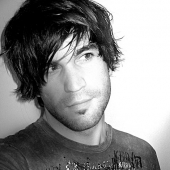Atheism
April 28 2006
So here is a synopsis of my thoughts (some people would use the word "beliefs") and how I got to these thoughts. Please respect it as it has been a long and thorough road. The "paper" is short, but it is good enough of a summary for now. I feel the need to put it up here to express myself and to clear up some common misconceptions about Atheism. Comments/Questions are welcome.
Here it is:
Atheism
I ascribe to strong atheism "believing that gods do not (or cannot) exist" (Matthew). Though I admit that I cannot say for sure gods do not exist, the extent to which I can say gods do not exist renders the terms "god" or "gods" useless for describing any unknown variables I may encounter. I come to the above conclusion by being an active freethinker- "one who is prepared to consider any possibility, and who determines which ideas are right or wrong by bringing reason to bear, according to a consistent set of rules" (Matthew). Using this way of coming to conclusions about the world around me, I will explain how I have come to believe that gods do not exist.
I have determined, based on observation, experience, religious research, and the accomplishments of science, that there are the following options about the existence, or non-existence, of gods.
1. God(s) exists and is involved in individuals' lives.
2. God(s) exists and is uninvolved in individuals' lives.
3. A force or energy connects everyone (some would call this god(s)).
4. God does not exist.
For option 1, I have found no evidence. The religions that make claims of higher powers have no physical proof of their existence. Claims of experiences with gods are often ambiguous and can be explained through the psychology of the mind and the powerful influences of social psychology. Positive events are attributed to god's favor and negative events are said to be a result of human wrong doing. Therefore, all possible events are explainable through the idea of god, but they are also explainable through psychological and scientific theories and laws. After all, "things do not exist merely because they have been defined to do so" (Matthew). Furthermore, I can see that throughout history peoples in all nations have used the idea of higher powers to explain the unknown. Through technology and the advances of science, the events that were previously attributed to the hand of god can be shown to have natural causes. In this sense, the need for the idea of a higher power in today's times is no longer.
If option 2 is correct, there is no need for a personal realization of god. This is the option that one might come to after finding no physical proof of god on earth. If god is undetectable and uninvolved, why does it matter if it exists or not?
Option 3 is one that progressive Christians tend to use, and one I myself ascribed to for some time. I thought that I couldn't believe the gods of religions because they were too limited by human terms, but I could at that point say there to be a connecting energy between people. Many would say this force is god because everyone is a part of it. However, in this case, using the age-old term "god" implies a powerful being instead of a neutral force. If a connection exists, it should simply be termed that.
So then option 4 is where I find myself. Options 2 and 3 render the term and understanding of god useless for my life or the lives of those around me, and option 1 lacks sufficient evidence. I feel living as if there is no god is the best option for me. I am aware every day of myself and my role in society. I alone am responsible for making my life the best it can be and for any consequences resulting from my actions. I am dependent on myself and the people around me for my biggest questions and not afraid to live without the answers if they are momentarily, or perhaps permanently, unattainable. I have come to peace with the idea that I am not going to live forever and will at some point die and cease to exist, though I cannot fathom the idea. I feel strongly about helping those around me because "we are all we have" (McGowan). Humility is something I experience daily as a result of atheism because I know I am small and relatively insignificant on a universal time scale. Knowing that I have evolved in some way from the things around me gives me a respect for the environment and awe for the process by which I am in existence. I feel atheism puts the responsibility of my life into my own hands more so than any other religions I have investigated or experienced.
Works Cited
Matthew. "An Introduction to Atheism". The Atheism Web. 4 March 2006. <http://www.infidels.org/news/atheism/intro.html>.
McGowan, Dale. "Atheist Virtues". Atheist Alliance. 4 March 2006. <http://www.atheistalliance.org/family/essay-mcgowan7.php>.
Here it is:
Atheism
I ascribe to strong atheism "believing that gods do not (or cannot) exist" (Matthew). Though I admit that I cannot say for sure gods do not exist, the extent to which I can say gods do not exist renders the terms "god" or "gods" useless for describing any unknown variables I may encounter. I come to the above conclusion by being an active freethinker- "one who is prepared to consider any possibility, and who determines which ideas are right or wrong by bringing reason to bear, according to a consistent set of rules" (Matthew). Using this way of coming to conclusions about the world around me, I will explain how I have come to believe that gods do not exist.
I have determined, based on observation, experience, religious research, and the accomplishments of science, that there are the following options about the existence, or non-existence, of gods.
1. God(s) exists and is involved in individuals' lives.
2. God(s) exists and is uninvolved in individuals' lives.
3. A force or energy connects everyone (some would call this god(s)).
4. God does not exist.
For option 1, I have found no evidence. The religions that make claims of higher powers have no physical proof of their existence. Claims of experiences with gods are often ambiguous and can be explained through the psychology of the mind and the powerful influences of social psychology. Positive events are attributed to god's favor and negative events are said to be a result of human wrong doing. Therefore, all possible events are explainable through the idea of god, but they are also explainable through psychological and scientific theories and laws. After all, "things do not exist merely because they have been defined to do so" (Matthew). Furthermore, I can see that throughout history peoples in all nations have used the idea of higher powers to explain the unknown. Through technology and the advances of science, the events that were previously attributed to the hand of god can be shown to have natural causes. In this sense, the need for the idea of a higher power in today's times is no longer.
If option 2 is correct, there is no need for a personal realization of god. This is the option that one might come to after finding no physical proof of god on earth. If god is undetectable and uninvolved, why does it matter if it exists or not?
Option 3 is one that progressive Christians tend to use, and one I myself ascribed to for some time. I thought that I couldn't believe the gods of religions because they were too limited by human terms, but I could at that point say there to be a connecting energy between people. Many would say this force is god because everyone is a part of it. However, in this case, using the age-old term "god" implies a powerful being instead of a neutral force. If a connection exists, it should simply be termed that.
So then option 4 is where I find myself. Options 2 and 3 render the term and understanding of god useless for my life or the lives of those around me, and option 1 lacks sufficient evidence. I feel living as if there is no god is the best option for me. I am aware every day of myself and my role in society. I alone am responsible for making my life the best it can be and for any consequences resulting from my actions. I am dependent on myself and the people around me for my biggest questions and not afraid to live without the answers if they are momentarily, or perhaps permanently, unattainable. I have come to peace with the idea that I am not going to live forever and will at some point die and cease to exist, though I cannot fathom the idea. I feel strongly about helping those around me because "we are all we have" (McGowan). Humility is something I experience daily as a result of atheism because I know I am small and relatively insignificant on a universal time scale. Knowing that I have evolved in some way from the things around me gives me a respect for the environment and awe for the process by which I am in existence. I feel atheism puts the responsibility of my life into my own hands more so than any other religions I have investigated or experienced.
Works Cited
Matthew. "An Introduction to Atheism". The Atheism Web. 4 March 2006. <http://www.infidels.org/news/atheism/intro.html>.
McGowan, Dale. "Atheist Virtues". Atheist Alliance. 4 March 2006. <http://www.atheistalliance.org/family/essay-mcgowan7.php>.

























